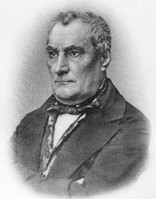
Birthday anniversary of Gavriil Stepanovich Batenkov, Decembrist and writer, Hero of the Patriotic War of 1812
March 25 (April 5), 1793, in the city of Tobolsk, in the family of an officer Stepan Batenkov was born Gavriil Batenkov, future Decembrist, philosopher, poet and critic, hero of the War of 1812.
Gavriil studied at Tobolsk military orphan department of the General People's School, then in the second Cadet Corps in St. Petersburg.
Batenkov participated in the Patriotic War of 1812 and foreign campaigns of the Russian army and was wounded. In 1814 he was awarded the Order of St. Vladimir, 4th class with bow. In 1816, he retired.
Having good math skills, he passed the examination for the vacant position with the Office of Communications. In 1817, he was appointed technical director of engineering and construction work in the city of Tomsk. From that moment he began his engineering work over the whole Siberia. He submitted his own scientific observations on the rivers Tom’ and Ushayka to the Board of Railways.
In 1819, Gavriil Batenkov was promoted to captain. At that time he met M. M. Speransky and accompanied him on a journey to Siberia. Batenkov brilliantly performed a number of his assignments: a project to strengthen the right bank of the Angara River, laying of a high road along the shore of Lake Baikal, and others. Gavriil was also involved in the development of laws and regulations to manage the region. G. S. Batenkov is one of the authors of the "Charter of the management of foreigners" - a legislative act of the Russian government, adopted in 1822. It defined the basic principles and a system to manage the peoples of Siberia, according to their way of life, customs, and degree of development. Batenkov prepared scientific reports on 7 subjects: 1) communication by land, 2) establishment of halting places, 3) the exiles, 4) the foreigners, 5) on the Siberian Cossacks, 6) the occupation of the Kyrghyz steppes by the Central horde, 7) making the lands of Siberia famous. Later these reports served the basis for the "Siberian Establishment" (1822).
In 1823, Gavriil Batenkov changed the service for the position of a member of the military settlements Council, headed by A. A. Arakcheev. In the final days before the Decembrist uprising December 14, 1825, he participated in the meetings of the Northern society - secret revolutionary organization; he gave various advices to Decembrists, but did not participate directly in the uprising. In 1826, the Supreme Criminal Court found Gavriil Batenkov guilty and sentenced him to penal servitude for life, which, in 1846, Emperor Nicholas I replaced with twenty years.
After the amnesty in 1856, Batenkov’s rights of a hereditary nobleman were restored. He returned to the European part of Russia and settled in the house of Evdokia Elagina, village of Petrishchevo, Tula province. He traveled to Moscow, St. Petersburg, Warsaw.
G. S. Batenkov lifelong studied social and political issues, problems of management of multiethnic population of the Siberian region. In the work on the Siberian reform, he showed himself as a supporter of rapprochement between the natives of Siberia, called "aliens" with the Russian people. He opposed the reactionary policy of tsarism, which considered the people of Siberia as "inferior", "defective", and supported the elimination of serfdom and the constitutional monarchy.
Gavriil Semenovich argued the need for Siberian laws based on the history, ethnography, climatology of the region; he considered inexpedient to centralize control in a multi-ethnic country like Russia. To prove this, he carried out a serious statistical research, which resulted in the "Table of the population of Siberia according to climate." Thus, G. Batenkov can be considered one of the founders of the Siberian statistics.
An important contribution of Batenkov to Russian legislation was the bills on Siberian exile - Statutes of the exiles and the halting places, along with the materials prepared for them. The most serious material for drawing the Statutes was the "Notes on the population of Siberia." The draft laws designed by Batenkov contained the most progressive ideas of governing the state without abuse and corruption.
Gavriil S. Batenkov spent his last years in Kaluga, where he died on October 29 (November 10), 1863.
Lit.: Большая Тюменская энциклопедия: энциклопедия. Т. 1. А-З / ред. Г. Ф. Шафранов-Куцев. Тюмень, 2004. С. 131; Васильев А. Возвращение памяти. Батеньков // Сибирское богатство. 2004. № 7. С. 83-88; Гарифуллин И. Б. Декабрист Батеньков и инородческий вопрос в Сибири // Словцовские чтения — 2007: материалы XIX Всерос. науч. краевед. конф. / Тюм. обл. краевед. музей им. И. Я. Словцова, Тюм. гос. ун-т. Тюмень, 2007. С. 71-74; Календарь знаменательных и памятных дат Тюменской области на 1993 год. Тюмень, 1992. С. 20-22; Тобольский биографический словарь. Екатеринбург, 2004. C. 57-59; Чупиро Н. Российский Монте-Кристо // Тюменская правда. 2009. 3 дек. С. 4; Шулинин Ю. А. От Ермака до Оленберга: хроника стольного града : [календарь дат и событий]. Тюмень, 2010. С. 15, 336, 540.
Based on the Presidential Library’s materials:
Базаров И. И. (протоиерей) Русская старина. Г. 32 1901. Т. 108, кн. 10, октябрь;
Довнар-Запольский М. В. Идеалы декабристов. М., 1907;
Потанин Г. Сибирские огни. Г. 3 1924, № 2 (апр./май). С. 66-74;
The material has been delivered by the Boris Yeltsin Presidential Library branch in the Tyumen region

